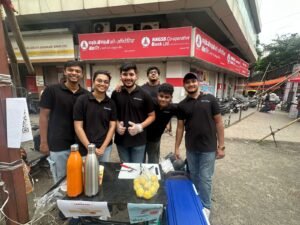
In the Middle of My Own Storm
Here’s a question for you: Do you know the Joker who juggles 3 balls in his hands? Have…
August 16, 2018
[dropcaps type=’square’ font_size=’80’ color=’#4a4a4a’ background_color=’#ffffff’ border_color=”]N[/dropcaps]o one, who is successful, is self-made.
Are you confused by this opening statement? Did I hear you scoff a little? Well, hold your breath and read on to know the secret to success.
This general notion that character, intelligence and hard work breed success is misleading, to say the least. Many people toil on a daily basis, working from sunrise and beyond sunset to earn bread for their family. But, if working hard is the path to success, then why are all these people not able to reach greater heights?
The answer to this question has been explained by Malcolm Gladwell in his bestseller, “Outliers: The Story of Success”. In this book, with the help of case studies, the author talks about the circumstances that make the achievers who they are.
You may be talented, with a high IQ, and you might be dedicatedly working towards your goals. You might still not be highly successful. Here’s the catch.
[blockquote text=”It is the background that you come from and the opportunities that present themselves to you because of that, that are major supporting factors for your success.” text_color=”” width=”” line_height=”undefined” background_color=”” border_color=”” show_quote_icon=”yes” quote_icon_color=”#4285F4″]
Let us look at Bill Gates’ story as an example. His life graph is quite well known. A brilliant, young genius, discovered computer programming, dropped out of Harvard and started a company called Microsoft with his friends. With his effort and sheer grit, it became a giant of the software industry. And the rest, they say, is history.
Is that it? No, when you dig deeper, you will realise that Gates belonged to a wealthy family in Seattle. In the seventh grade, his parents shifted him to a private school, Lakeside, which catered to children of the elite families. It was at this school, in 1968, that a computer terminal was set up. And it wasn’t the one based on the laborious card-system of the 60s, it was a time-sharing computer with a direct link to a mainframe computer in downtown Seattle. Henceforth, Gates lived in the Computer laboratory.
From his eight grade to his sophomore year, when he dropped out of Harvard, Bill Gates had had more than 7 years of practice in programming at Lakeside and later, at the University of Washington, near which he resided. He was way ahead of his peers. How? Because he had been presented with an opportunity, which very few people had, and he grabbed it.
Another famous man, who was every bit successful as Gates was, is Steve Jobs, the co-founder of Apple Inc. Now, Jobs wasn’t from a wealthy family like Gates and he didn’t have access to a computer like the one Gates had at Lakeside. And you might ask how does he fit Gladwell’s category of Outliers? And the answer is that Jobs grew up in Mountain View, California which is the epicentre of the Silicon Valley. The neighbourhood that he resided in was filled with engineers from Hewlett-Packard (HP), which was even then a leading electronics firm in the world.
During his teenage, Jobs frequented the flea markets of his area, where electronics hobbyists sold spare parts. In the evenings, he attended talks by HP engineers where they discussed the latest advances in electronics. In his unique style, he even requested Bill Hewlett, one of the founders of HP for spare parts, Not the one to miss an opportunity, Jobs managed to land a summer job with them. At that job, he built computers on the assembly line. The process fascinated him and he tried to design his own computer. The result of that, as we all know, is the world’s favourite technology brand.
Thus, the stories of these two geniuses show that success is not merely a result of personal merit. The place they grew up in, their neighbourhood, the people they interacted with and their family were the base from which they propelled themselves. These aspects played a major role in their achievements.
You might question this by saying that there were so many people who must have belonged to the same school as Gates or the same neighbourhood as Jobs, so why didn’t they become renowned? And you are right when you ask that. And as you ask that, a tiny inkling of an answer would have formed in your mind too, hasn’t it? The reason that Gates or Jobs succeeded is that their ‘ecology’ presented them with a fruit of opportunity, which was ripe, and they bit into it at the right time.
Of course, it doesn’t take away from the fact that they put in hours of practice, making projects through trial and error, which honed their skills. Without this, they wouldn’t have acquired expertise in their field. However, they had a big head start as compared to his peers. And they were smart enough to understand the opportunities and the advantage they had.
Finally, all this boils down to one thing – success is not got by sheer talent and determination only. It is achieved by leveraging the opportunities that come your way and seizing the right ones. Do something. Carpe Diem, my friends!
Read how Yusuf Hakim made the full use of the opportunity which came his way.


Let's Enterprise is a pioneering educational institution that empowers students with hands-on business skills through its unique UG-M.E.D. program. With campuses in Pune and Goa, it bridges the gap between traditional learning and real-world experience, shaping the future of tomorrow's entrepreneurs.
Discover how our first-year students are actively engaging in real-world business projects, guided by facilitator Sharjeel Shaikh.